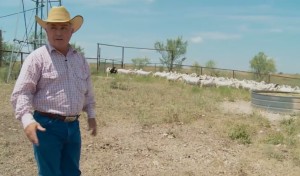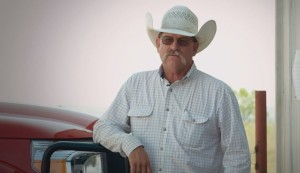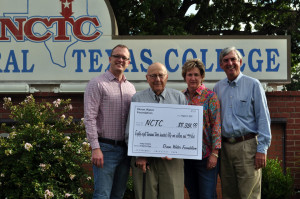One of our partners, Rocky Mountain Bird Observatory, collaborates with private landowners in northern Mexico to support working ranches and improve grassland habitat for birds and other wildlife. They produced this great video about sustainable ranching in Chihuahuan Desert grasslands earlier this year.
MEDIA COVERAGE
Rodent recovery at Mimms in Texas Wildlife magazine
The recovery of small mammals at Dixon Ranches Mimms Unit in Marfa, following the 2011 Rock House Fire, was featured in the September 2014 issue of Texas Wildlife magazine. Writing for the Texas Wildlife Association publication, graduate student Bobby Allcorn and Professor Bonnie Warnock of Sul Ross State University‘s Borderlands Research Institute describe their Dixon-supported research on rodents at Mimms and a neighboring ranch in Presidio County. They write:
Rodents are such an integral part of their ecosystems that management plans for a landscape, or a species, should take into account the potential state of the small mammal population. The research being conducted here will help landowners and wildlife professionals make more informed decisions and develop better strategies to achieve their goals.”
Dixon grazing system featured in Big Bend Courier
The Big Bend Courier featured grazing management at Mimms Unit, as part of an article about the Holistic Management International Open Gate held there this September.
Open Gate at Mimms on Marfa Public Radio
You can now listen to the Sept. 8 Talk at Ten interview with Dixon Ranches Mimms Unit manager Casey Wade. He spoke with K. Yoland at Marfa Public Radio about the upcoming Open Gate, sustainable ranching, and other news at Mimms. Ann Adams from Holistic Management International also called in for the interview, and Megan Wilde, who manages communications for the foundation, joined them in the studio.
Out on the Land features Bear Creek
RFD TV’s Out on the Land episode about Dixon Ranches Bear Creek Unit can now be viewed online and includes interviews with foundation ranch managers Danny Parker and Robby Tuggle.
A thoughtful defense of holistic management
Last week in The Guardian, L. Hunter Lovins offered a thoughtful defense of holistic management: “Why George Monbiot is wrong: grazing livestock can save the world.” Lovins was responding to George Monbiot’s previously published critique of Allan Savory’s 2013 TED Talk (“How to fight desertification and reverse climate change“).
“In his recent interview with Allan Savory, the high profile biologist and farmer who argues that properly managing grazing animals can counter climate chaos, George Monbiot reasonably asks for proof. Where I believe he strays into the unreasonable, is in asserting that there is none.
Savory’s argument, which counters popular conceptions, is that more livestock rather than fewer can help save the planet through a concept he calls “holistic management.” In brief, he contends that grazing livestock can reverse desertification and restore carbon to the soil, enhancing its biodiversity and countering climate change. Monbiot claims that this approach doesn’t work and in fact does more harm than good. But his assertions skip over the science and on the ground evidence that say otherwise.”
He cites research by Richard Teague, a Dixon Water Foundation advisory board member, “finding significant soil carbon sequestration from holistic range management practices.” He also mentions several examples of successful holistic management practitioners, as well as studies by soil microbiologist Dr. Elaine Ingham:
“Peer-reviewed research from Rodale [Institute] has shown how regenerative agriculture can sequester more carbon than humans are now emitting. Scientists, as well as dozens of farmers, ranchers and pastoralists from around the world, describe how they are increasing the health of their land, the carrying capacity of it, its biodiversity, and its profitability, all while preserving their culture and traditions…
…I’d invite [Monbiot] to come out on the land, see with his own eyes and learn from those who are healing grasslands while producing food, fibre and community prosperity.”
Josey Agroecology Institute in Lewisville Leader
On August 12, the Lewisville Leader featured the Josey Agroecology Institute at North Central Texas College, funded by a grant from the foundation.
Clint Josey (second from left), the Chairman of the Board of Directors of the Dixon Water Foundation, presents a check to NCTC officials to establish the Josey Institute of Agroecology. Also pictured is NCTC President Dr. Brent Wallace (left), NCTC Science and Math Initiatives Chair Dr. Lisa Bellows, and Dixon Water Foundation CEO Robert Potts.
Cattle could help meet EPA emissions target
Russ Conser’s letter to the editor, “Research could pay off“, in the July 10 Houston Chronicle suggests holistic cattle grazing could help Texas meet new Environmental Protection Agency emissions guidelines, citing research by Dixon Water Foundation advisory board member Richard Teague. His letter brings up some excellent points and is well worth reading. Here’s an excerpt:
Research by Dr. Richard Teague at Texas A&M University on ranches in north central Texas indicates the ability to take up roughly 1.2 tons of carbon per acre in ranch land soils simply by changing how cattle are grazed on the land. More research is needed, but if the same numbers held up on average elsewhere in the state, implementing these methods on just 3 million acres, or just 1.7 percent of the land area of Texas (172 million acres), would offset 10 percent of the EPA emissions target given to Texas.
These techniques also lead to higher rancher productivity, lower costs, increased water infiltration and holding capacity, and increased biodiversity. Implementation would also lead to better drought resilience, less flooding, better hunting habitat and enhanced rural economies.
Texas, still the largest producer of cattle in the country, would be smart to consider implementation of novel grazing practices as part of its EPA response plan. We would truly be a leader in doing so.
Water conservation featured in Lands of Texas
As Texas’s water supplies become increasingly scarce, good land management can play a critical role in protecting watersheds. This was the message of a recent Dallas Morning News opinion piece, “Holistic ranching essential as demand for water grows.” It was also the subject of a recent article in Lands of Texas magazine, which highlights how Dixon Ranches use holistic management to conserve water.
Bear Creek wins Lone Star Land Steward Award
The Dixon Water Foundation’s Bear Creek Unit in Parker County has been recognized with a Lone Star Land Steward Award from Texas Parks and Wildlife Department. This honor was covered by The Weatherford Democrat and the Gainesville Daily Register.
TPWD also produced this feature about our work at Bear Creek:





